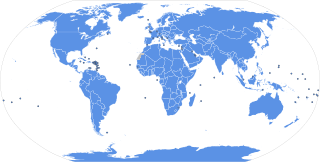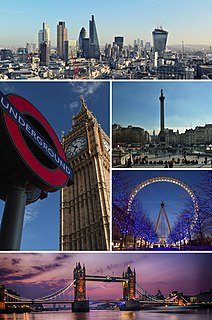
Bermuda was originally discovered in 1503 by Spanish explorer Juan de Bermúdez. In 1609, the English Virginia Company, which had established Jamestown in Virginia two years earlier, permanently settled Bermuda in the aftermath of a hurricane, when the crew and passengers of Sea Venture steered the ship onto the surrounding reef to prevent it from sinking, then landed ashore. Bermuda's first capital, St. George's, was established in 1612.

Bermuda is a parliamentary representative democratic dependency. The premier is the head of government, and there is a multi-party system.

The Bermuda sloop is a type of fore-and-aft rigged single-masted sailing vessel developed on the islands of Bermuda in the 17th century. Such vessels originally had gaff rigs with quadrilateral sails, but evolved to use the Bermuda rig with triangular sails. Although the Bermuda sloop is often described as a development of the narrower-beamed Jamaica sloop, which dates from the 1670s, the high, raked masts and triangular sails of the Bermuda rig are rooted in a tradition of Bermudian boat design dating from the earliest decades of the 17th century. It is distinguished from other vessels with the triangular Bermuda rig, which may have multiple masts or may not have evolved in hull form from the traditional designs.

The British Overseas Territories (BOTs) or United Kingdom Overseas Territories (UKOTs) are 14 territories under the jurisdiction and sovereignty of the United Kingdom. They are remnants of the British Empire that have not been granted independence or have voted to remain British territories. These territories do not form part of the United Kingdom and, with the exception of Gibraltar, are not part of the European Union. Most of the permanently inhabited territories are internally self-governing, with the UK retaining responsibility for defence and foreign relations. Three are inhabited only by a transitory population of military or scientific personnel. They all share the British monarch as head of state.
In the British Empire, a self-governing colony was a colony with an elected government in which elected rulers were able to make most decisions without referring to the colonial power with nominal control of the colony. Most self-governing colonies had responsible government.

Before European colonization, the Turks and Caicos Islands were inhabited by Taino and Lucayan peoples. The first recorded European sighting of the islands now known as the Turks and Caicos occurred in 1512. In the subsequent centuries, the islands were claimed by several European powers with the British Empire eventually gaining control. For many years the islands were governed indirectly through Bermuda, the Bahamas, and Jamaica. When the Bahamas gained independence in 1973, the islands received their own governor, and have remained a separate autonomous British Overseas Territory since. In August 2009, the United Kingdom suspended the Turks and Caicos Islands' self-government following allegations of ministerial corruption. Home rule was restored in the islands after the November 2012 elections.
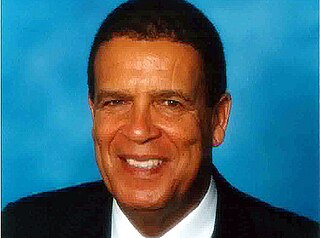
Sir John William David Swan is a former Bermudian political figure. A real estate developer, a political luminary and a philanthropist, Swan served as Premier of Bermuda from 1982 to 1995.
The Bermudian dollar is the official currency of the British Overseas Territory of Bermuda. It is subdivided into 100 cents. The Bermudian dollar is not normally traded outside Bermuda, and is pegged to the United States dollar at a one-to-one ratio. Both currencies circulate in Bermuda on an equal basis.
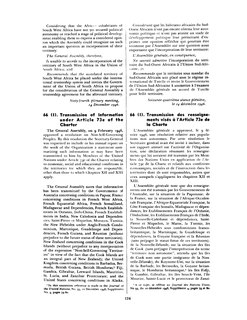
The United Nations list of Non-Self-Governing Territories is a list of places that the United Nations General Assembly deems to be "non-self-governing" and subject to the decolonization process. Chapter XI of the United Nations Charter embodies a "Declaration on Non-Self-Governing Territories" which declares that the interests of the occupants of dependent territories are paramount and requires member states of the United Nations in control of non-self-governing territories to submit annual information reports concerning the development of those territories. Since 1946, the General Assembly has maintained a list of non-self governing territories under member states' control. Since its inception, dozens of territories have been removed from the list, typically when they attained independence or internal self-government, while other territories have been added as new administering countries joined the United Nations or the General Assembly reassessed the status of certain territories.
British Overseas Territories citizenship (BOTC), formerly called British Dependent Territories citizenship (BDTC), is a class of British nationality granted to people connected with one or more of the British Overseas Territories. Individuals with this nationality are British nationals and Commonwealth citizens, but not British citizens. The status itself does not grant right of abode in the United Kingdom or any of the territories, though all BOTCs would have had belonger status in a territory on acquisition. Nationals of this class are subject to immigration controls when entering the United Kingdom and do not have the automatic right to live or work there.
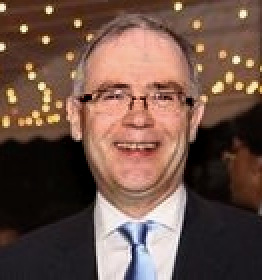
The Governor of Bermuda is the representative of the British monarch in the British overseas territory of Bermuda. The Governor is appointed by the monarch on the advice of the British government. The role of the Governor is to act as the de facto head of state, and he or she is responsible for appointing the Premier and the 11 members of the Senate.
The Commonwealth of Australia was formed on 1 January 1901, when the six British colonies of Australia were merged to form a single commonwealth within the British Empire. Apart from Western Australia, all of the founding area of the country was originally part of the Colony of New South Wales, founded in 1787. Since federation, the only changes to the borders have been the creation, acquisition, or independence of territories. Two countries became independent from Australia in the mid-20th century: Nauru, originally mandated to the country by the League of Nations; and Papua New Guinea, a combination of an earlier British protectorate and a League of Nations mandate.

General elections were held in Bermuda on 18 December 2007 to elect all 36 members of the House of Assembly. The incumbent Progressive Labour Party (PLP) led by Ewart Brown was returned for a third term, with 22 of the 36 seats of the House of Assembly, with the opposition United Bermuda Party (UBP) winning the remaining 14 seats.

Lesbian, gay, bisexual, and transgender (LGBT) persons in Bermuda face legal challenges not experienced by non-LGBT persons. Homosexuality is legal in Bermuda, but the territory has long held a reputation for being homophobic and intolerant. Since 2013, the Human Rights Act has prohibited discrimination on the basis of sexual orientation.
Ann Frith Cartwright DeCouto was a Bermudian politician, lawyer and a member of the former United Bermuda Party (UBP). She served as a member of the House of Assembly of Bermuda 1983 until 1998, which included a tenure as Deputy Premier from 1989 to 1992 under Premier John Swan, as well as the head of several government ministries under the UPI during the 1980s and 1990s. Cartwright DeCouto was perhaps best known as the island's Minister of the Environment, also from 1989 to 1992. In 1990, she enforced a ban on fishing with fishpots in Bermudian waters, a move which was highly unpopular at the time. However, Cartwright DeCouto's ban on the fishpots is now widely credited with reviving Bermuda's fish stocks.
Same-sex marriage is currently legal in the British Overseas Territory of Bermuda. It first became legal on 5 May 2017, when the Supreme Court of Bermuda declared that same-sex couples had a legal right to marry in the territory after a couple filed suit against the Bermudian Government. However, a bill to ban same-sex marriage and establish domestic partnerships was passed by the Parliament in December 2017 and went into effect on 1 June 2018, though same-sex marriages performed before that day remained legally recognised.


